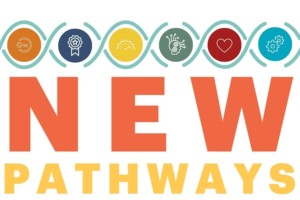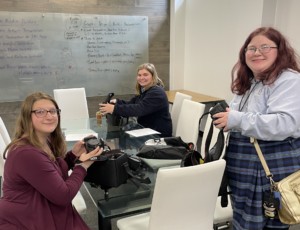Trade Unions Pave Pathways to Good Jobs

At the most important conference on education innovation, the most important announcements came at the very end. In the last two sessions of the ASU-GSV conference in San Diego (#ASUGSV2019), unlikely allies laid out ambitious plans for new career high schools that will prepare young people for high wage, high demand jobs.
Jim Sweeney (above right), President of Chicago’s International Union of Operating Engineers Local 150 (@Local150), announced plans for a private high school that would incorporate the training programs of his union and potentially many others.
The school will recruit qualified African American and Latino students to improve historically low participation rates of minorities in Chicago’s union apprenticeship programs.
Myles Mendoza, President of Empower Illinois (@mylesxmendoza), explained that with minor changes in an existing policy, new schools to support these new apprenticeship high schools could be funded with tax credit scholarships. Developers of massive construction projects recently approved by the city council and backed by Mayor-elect Lori Lightfoot could prove to be funding sources.
Leading Chicago philanthropist Jim Perry moderated the panel and has supported the plan for more private job training over the past four years. Perry is Managing Director Madison Dearborn Partners and is Chair of the Empower Illinois.
Competition for the high wage, high demand jobs represented by Local 150 has become fierce. For the most recent training programs, there were 5,000 applicants for about 250 spots–and 40% of the applicants had college degrees.
Local 150 has been involved in training and apprenticeships for over 100 years. Maintaining the quality of training programs and managing access to those programs are two reasons Sweeney likes the idea of a private high school. “We want to control programming and enrollment,” said Sweeney.
In addition to operating heavy equipment, the school will support pathways to engineering, electrical and carpentry careers. These family wage jobs are not likely to be automated away but will increasingly be augmented by new technology making training requirements quite dynamic and requiring close partnerships with labor and employers.
Students in the new high school will have the opportunity to sample several job categories. Access to training and apprenticeships will be incorporated into the student day so that they graduate job ready.
In addition to the embedded job training, unique structure and funding, the new school is likely to be personalized and competency-based with students meeting graduation requirements and demonstrating job readiness at their own pace.

Propel America
In the other career education announcement at ASU-GSV, Louisiana state superintendent John White (above right, @LouisianaSupe) announced the formation of a national nonprofit Propel America (@PropelAmerica) to connect young people with good jobs. Propel America works with training partners and employers to connect high school students with paid internships and high wage employment.
White’s co-founder Paymon Rouhanifard (@Rouhanifard) will serve as CEO of Propel America.
Previously he served as the superintendent of Camden, New Jersey where he engaged families and led improvements in student outcomes and reductions in suspensions.
Propel will offer navigation services, small cohort weekly meetings where young people will meet with an advisor. Once students are placed in a paid apprenticeship, they will have access to a mentor.
Propel America starts in high school with a course that helps students explore interests and career paths, and build professional skills. Participants enroll in a three to nine-month credentialing program provided by a community college, training provider or bootcamp. While out of high school, participants receive a stipend, navigation supports, and peer cohort meetings.
Young people who earn a credential are guaranteed an interview with a partner employer. Navigator, industry mentorship and cohort support continue for the first six months of employment to encourage persistence and advancement.
Propel America is more a template than a program. It connects employers, high schools, training providers and mentors at the critical transition between high school and post-secondary life.
In 2019, Propel will be working in Camden and Pennsauken, New Jersey and Baton Rouge and Jefferson Parish, Louisiana. “Propel is piloting in these communities with aspirations to build a scalable template that can be used in any community in the country, urban or rural, red or blue, to connect high school graduates to good first jobs,” said White.
Instead of pushing all youth to college, both announcements are good examples of what investor Ryan Craig argues for, a hard sprint to a good first job.
For more see
- Career Ready High Schools
- Last-Mile Training as an Alternative to Higher Ed with Ryan Craig
- How Career and Technical Education Can Inform Competency-Based Learning
This post is a part of the Getting Smart Future of Work Campaign. The future of work will bring new challenges and cause us to shift how we think about jobs and employability — so what does this mean for teaching and learning? In our exploration of the #FutureOfWork, sponsored by eduInnovation and powered by Getting Smart, we dive into what’s happening, what’s coming and how schools might prepare. For more, follow #futureofwork and visit our Future of Work page.
Stay in-the-know with innovations in learning by signing up for the weekly Smart Update.
This post was originally published on Forbes.









0 Comments
Leave a Comment
Your email address will not be published. All fields are required.